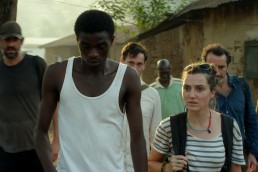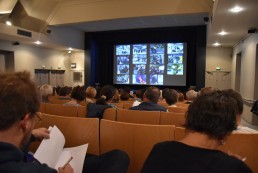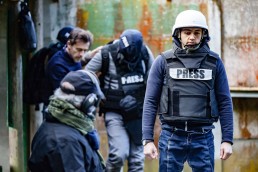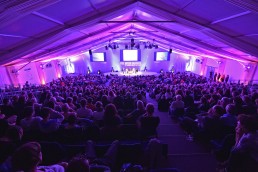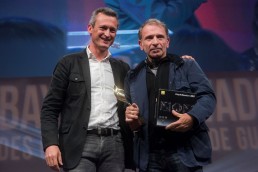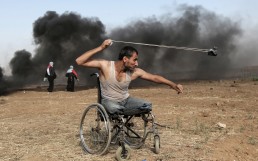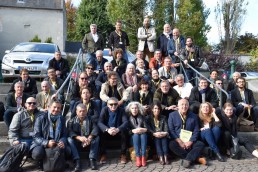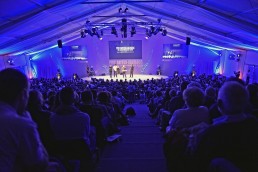Cinema evenings: last minute infos
The first two nights of the Bayeux Calvados-Normandy Award for war correspondents will take place in the Méliès with two cinema screenings. Guillaume de Fontenay, director of the film Sympathie pour le diable, Nina Meurisse, lead actress of the film Camille, Michaël Zumstein, photojournalist who participated in its realization and the mother of Camille Lepage have just confirmed their arrival in Bayeux.
Monday 7th October - 8.30 pm - Premiere of the movie Sympathie pour le diable
Inspired by real events, based on the account “Sympathy for the Devil” by Paul Marchand. Hiding his extreme sensitivity behind an armour of
sarcasm, vulnerable despite his bravado and strong despite his flaws, Paul Marchand established his reputation during the siege of Sarajevo in 1992-1993. An inveterate risk-taker, provocative and meticulous in recounting the horrors around him, he famously wrote messages to snipers on his car: “Don’t Waste your Bullet I’m Immortal” and “Morituri te Salutant”. But this is the story of his gradual revolt against the fate of ordinary people caught in a vice under a rain of shells, the apathy of the international community and the uncaring attitude of some of his colleagues for whom the war was just a “good subject” to be reporting on. This film is an immersion into what the profession of war correspondent is really like, marked by violence, atrocities and injustice.
The screening will be followed by an exchange with Guillaume de Fontenay, director.
Tuesday 8th October - 8.0 pm - Premiere of the movie Camille
Camille Lepage, a young photojournalist full of ideals, leaves for Central Africa to cover the impending civil war . What she sees there will change her destiny.
The screening will be followed by an exchange with Boris Lojkine, director, Nina Meurisse, lead actress, Michaël Zumstein, photojournalist and the mother of Camille Lepage.
Practical informations
Cinema Le Méliès
Admission (for each): 6,50 €
Public prize and awards night: registrations are open!
Interested persons should call the following indigo number: 0 825 014 400 (€ 0.15 incl. Tax / min)
Within the limit of available seats.
Public prize - Saturday, October 12 from 10am to 12pm
A jury will nominate its winner in the photo category. This public prize will be awarded during the awards night.
10am: vote of the jury sponsored for the 6th year by the French Development Agency
11am: feedback on the 2018 public award for Paula Bronstein's report on the Rohingya crisis.
Awards Night - Saturday, October 12 at 6:30 pm
This evening, presented by Nicolas Poincaré, will be an opportunity to take stock of the news of the past year. It will be punctuated by unpublished topics specially made for this meeting. The public will also discover the winning reports, in the presence of the jury and many journalists.
Gary Knight, President of the jury of the 26th edition
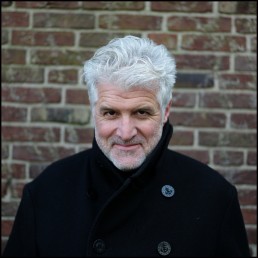
© Alizé Le Maoult
The president of our jury this year will be one of the most seasoned war photographers of our time. Gary Knight’s photos have been published by Newsweek, Time, The Sunday Times, The New York Times, Paris Match, Stern and National Geographic. His work has been exhibited all over the world and is included in the collections of several museums. Gary Knight is also co-founder and a director of the VII Agency.
Gary Knight began his photography career in the late 1980’s photographing the wars in Cambodia and Burma. He was a contract photographer for Newsweek in the 1990’s and 2000’s during which time he photographed the wars in Bosnia, Kosovo, Iraq, Afghanistan, Kashmir, Liberia, Congo and Israel Palestine.
Gary is co-founder and director of the VII Photo Agency. He is also the co-director of the VII Foundation and director and founder of the VII Academy. Gary is a member of the Board of Trustees of the Frontline Club, London; co-founder of The GroundTruth Project, Boston; founding director of the Program for Narrative & Documentary Practice at the Institute for Global Leadership at Tufts University; twice chair and president of the World Press Photo Award; was a Nieman Fellow at Harvard University in 2009; and a Logan Non Fiction Fellow at the Carey Institute in 2017.
« It is a great privilege to be invited to Chair the jury of the Bayeux Award for war correspondents this year and to honour the men and women who file dispatches and images from fields of conflict. It is especially poignant to do this at a time when our media are increasingly under attack by politicians and governments – even in countries where a free press is enshrined in the constitution. War reporting is a vital and essential function of journalism. It is critical to civil society, to our sense of justice and accountability and to basic human rights.
As the late Marie Colvin said in 2010, two years before she was killed in Homs: “The public have a right to know what our government, and our armed forces, are doing in our name. Our mission is to speak the truth to power. We send home that first rough draft of history. We can and do make a difference in exposing the horrors of war and especially the atrocities that befall civilians”. »
Gary Knight
Visual
The 2019 visual is a photo from the 2018 winning report. This photograph taken by Mahmud Hams from Agence France-Presse (AFP), was part of his report shot in Gaza between February and May 2018.
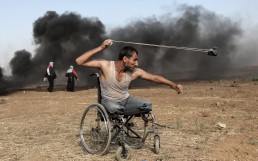
Caption: Palestinian Saber al-Ashkar, 29, hurls rocks during clashes with Israeli forces along the border with the Gaza strip, east of Gaza City, on May 11, 2018, as Palestinians demonstrate for the right to return to their historic homeland in what is now Israel.
Mahmud Hams
Mahmud Hams, 38, holds a degree from the Islamic University of Gaza in journalism and information. He joined Agence France-Presse in 2003 and covers day-to-day current affairs in the Gaza Strip and occasionally in Libya and Egypt. He has received many international awards including the Bayeux award in 2007 and 2018.
© Bayeux Award photo 2018 – Mahmud Hams / AFP
An exceptional occasion for school children
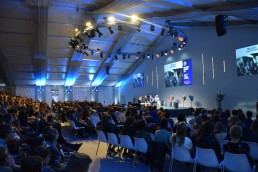
For the 26th edition the HCR - the United Nations Agency for refugees - and Ouest-France newspaper will be organising an outstanding event for middle and high school students in Normandy, “the HCR-Ouest-France Encounters”.
As partners of the Bayeux award the HCR and Ouest-France will be addressing school students and inviting them to meet refugees who will talk about their experiences of exile and the importance of international protection for those fleeing from war and persecution. In this age of instantaneous information, the HCR and Ouest-France aim to give young people a different understanding of the position of refugees in France and around the world.
Workshop Nikon – Le Manoir

In the framework of the Bayeux award for war correspondents, Nikon will be organising a workshop for talented young photojournalists, as it has done each year since 2013.This year, Nikon is joining forces with the Manoir Centre, which was set up in 2014 by France Médias Monde to provide training for journalists working in dangerous zones. In association with INA (the French national audiovisual archive) and with the support of Reporters Without Borders, the Manoir will soon have trained almost 300 journalists from a variety of backgrounds. The training course was designed for journalists working for France Médias Monde, but is open to all media and is training journalists from Le Monde newspaper, Arte, Canal + and the French public television channels, among others. The training provided by the Manoir is now recognised as the reference standard in its field.
While it is obvious that research and information-sharing are essential, the safety of journalists on assignment has to be both the primary concern and the starting point in the editorial process. Because the journalist is the principal player in his or her own safety, the Manoir provides specific training and methodologies given by journalists to journalists, and brings in leading experts in the fields of health, emergency rescue and psychology. The effects of weapons, the dangers of mines and orientation skills are also taught by expert practitioners who are experienced in training news professionals.
By the end of the training course, the journalist situated in a danger zone is able to assess risks more accurately, to understand critical situations and to react more adroitly to accidents in the field.
With over a century of existence and by virtue of its values and commitment, supporting photojournalists is part of Nikon’s DNA. In partnership with the Manoir, Nikon wants to support talented young photojournalists in the exercise of their profession by giving them the best possible training.
© GUILLAUME LOUYOT – FRANCE MEDIAS MONDE
New partners for the 26th edition
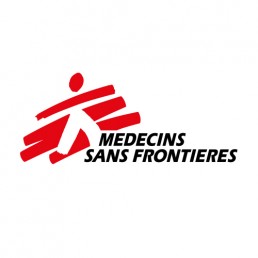
Médecins Sans Frontières
Doctors Without Borders is an international humanitarian medical organization which was set up in Paris in 1971 by doctors and journalists. MSF provides medical aid to populations whose lives or health are threatened, particularly in cases of armed conflicts but also when there are epidemics or natural disasters.
For almost 50 years the organization has been developing its work in the same regions as war correspondents, and shares the same aims – to raise awareness of and highlight the plight of populations suffering the consequences of conflict. From Afghanistan, Rwanda and the Balkans yesterday to Iraq, Central African Republic or Yemen today, MSF is there to treat the suffering and bear witness.
So it follows quite naturally that MSF has now become a partner of the Bayeux award for war correspondents.
Photography has played an important role in the history of MSF. War photographers and photojournalists have been working alongside humanitarian teams for years, capturing the immediacy of events with pictures that reflect personal stories. But behind the immediacy, their work also allows the background history of a region and the suffering of populations affected by conflict, natural disasters or disease to be revealed.
Crédit Agricole Normandie
Crédit Agricole Normandie is a co-operative bank and the leading financial institution in its region, with 748,000 clients. It offers the full range of expertise needed to meet the banking and insurance requirements of individuals, companies and local authorities.
As a player in both economic and social sectors Crédit Agricole Normandie is also involved in major structural projects in the region. As a leading bank it was therefore natural that it should be a partner of the Bayeux award for war correspondents through the Young Reporter award.
We are very proud to be associated with this internationally renowned event which has been enhancing the reputation of our region for more than 20 years. The Bayeux award sheds light on and helps us to decipher current affairs in an increasingly complex world by paying tribute to journalists - who carry out their profession at the risk of their lives - and who ensure the freedom and independence of information, which is fundamental to our democracies.
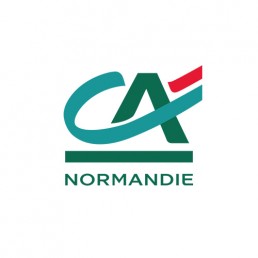
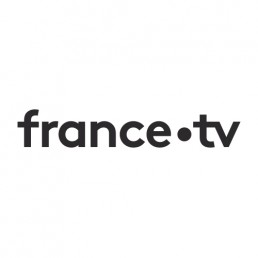
France Télévisions
France Télévisions was the leading audiovisual group in France in 2018 with an audience share of 28.4%, attracting 32 million people in France every day thanks to a rich and varied mix of programming.
In a world which is more and more complex and uncertain, information – which is at the core of France Télévisions’ mission – is an essential component in building a bond of trust with the audience.
14.5 million viewers keep up with current affairs through France Télévisions’ news programmes every day. The group provides the broadest range of factual programming in the French television landscape with more than 60 regular shows across the group’s channels – investigative current affairs magazines, political and debate shows, magazines devoted to social themes, the economy, Europe, international current affairs and culture.
France Télévisions is treating the fight against fake news and taking action to encourage media education as a priority: new formats have been created to scrutinise information that is circulating, such as “Faux et usage de faux” (“Forgery and falsification”), in the 8pm television news bulletin on France 2 and “ Vrai ou fake – l’envers de l’info” (“True or fake – behind the news”) on France Info channel 27, not forgetting the website “Vrai ou fake” (“True or fake”) on franceinfo.fr which brings together all the fact-checking modules provided by the main public service media.
Tribute to Yannis Behrakis
We are profoundly saddened to learn of the death of Yannis Behrakis. As winner of the Prix Bayeux in 2002 (Public prize for a report in Afghanistan) and 2016 (Nikon Photo prize and Public - French Development Agency prize for a report on refugees) he had moved everyone in the
audience at the 2016 award ceremony when he announced that he would donate his Public prize to Doctors Without Borders. Yannis Behrakis leaves us with the memory of a great professional and a man full of warmth and humanist spirit. All our thoughts are with his family and loved ones.
25th edition of the Bayeux Calvados-Normandy Award: results
Fifty war correspondents have gathered in Bayeux on October 12th and 13th to debate and award trophies in the following categories: photo, print, radio, television, grand format television, young reporter (photo) and video image. Three honorary awards have been attributed: the Regional prize for students and trainees of Normandy (television), the Public’s Choice award (photo) and the Ouest-France – Jean Marin prize (print). Presided by Christiane Amanpour, the international jury of the 25th edition of the Bayeux Calvados-Normandy Award for war correspondents has reached its verdict…
“I am proud to be in Bayeux and to chair the international jury of the 25th Bayeux Calvados-Normandy Award for war correspondents. The entries are extremely powerful and of a very high quality. It was a pleasure to watch them with my colleagues, discuss them, debate and vote.“
Christiane Amanpour
PHOTO TROPHY – INTERNATIONAL JURY
AWARDED BY NIKON
1st Prize
Mahmud HAMS
AFP
Clashes on Gaza’s border
PALESTINE
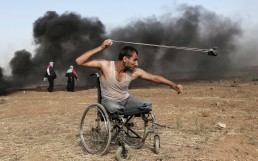
2nd Prize
Laurent VAN DER STOCKT
LE MONDE
La vieille ville de Mossoul : la bataille contre le dernier bastion de Daesh
IRAQ
3rd Prize
Juan BARRETO
AFP
Venezuela: anti-government protests
VENEZUELA
TELEVISION TROPHY – INTERNATIONAL JURY
AWARDED BY AMNESTY INTERNATIONAL
1st Prize
Nima ELBAGIR, Alex PLATT and Raja RAZEK
CNN
Libya Slave Auction
LIBYA
2nd Prize
Clive MYRIE and Darren CONWAY
BBC
Mexico’s drug war
MEXICO
3e Prix
Jonathan HEAD and Daniel BULL
BBC
Rohingya
BANGLADESH
PHOTO TROPHY – PUBLIC’S CHOICE AWARD
SPONSORED BY THE FRENCH DEVELOPMENT AGENCY (AFD)
1st Prize
Paula BRONSTEIN
GETTY IMAGES REPORTAGE
The Rohingya crisis: a harrowing journey
BANGLADESH
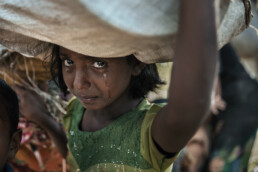
PRINT TROPHY – INTERNATIONAL JURY
AWARDED BY THE DEPARTMENT OF CALVADOS
1st Prize
Kenneth R. ROSEN
THE ATAVIST MAGAZINE
The Devil’s Henchmen
IRAQ
2nd Prize
Wolfgang BAUER
ZEITMAGAZIN INTERNATIONAL
The poison of war
SUDAN
3rd Prize
Rukmini CALLIMACHI
THE NEW YORK TIMES
La méthode Daech, ou l’administration par la terreur
IRAQ
RADIO TROPHY – INTERNATIONAL JURY
AWARDED BY THE D-DAY LANDING COMMITTEE
1st Prize
Gwendoline DEBONO
EUROPE 1
Ni prisonnières, ni réfugiées : femmes djihadistes en Syrie
SYRIA
2nd Prize
Julie PIETRI
FRANCE INTER
Rohingyas, l’enfer de la traversée
BANGLADESH
3rd Prize
Martin PATIENCE
BBC
Survivre à une tempête de neige syrienne
SYRIAN BORDER (LEBANON)
YOUNG REPORTER TROPHY (PHOTO) – INTERNATIONAL JURY
SPONSORED BY CAPA PRESSE TV
1st Prize
Mushfiqul ALAM
FREELANCE
The Great Exodus
BANGLADESH
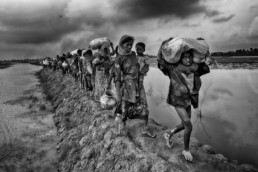
GRAND FORMAT TELEVISION TROPHY – INTERNATIONAL JURY
AWARDED BY SCAM
1st Prize
Nicolas BERTRAND and Thomas DONZEL
FRANCE 2
Rohingyas : les damnés de la Birmanie
MYANMAR and BANGLADESH
VIDEO IMAGE TROPHY – INTERNATIONAL JURY
SPONSORED BY Bew TV / FRANCE 24 / ARTE
1st Prize
Darren CONWAY
BBC
Mexico’s drug war
MEXICO
PRINT TROPHY – OUEST-FRANCE – JEAN MARIN
1st Prize
Jean-Philippe REMY
LE MONDE
Le Yémen en guerre
YEMEN
TELEVISION TROPHY – REGIONAL PRIZE FOR STUDENTS AND TRAINEES OF NORMANDY
1st Prize
Stéphanie PEREZ, Nicolas AUER and Laetitia NIRO
FRANCE 2
Les lionceaux du Califat : des bombes à retardement ?
IRAQ
Our 25th international jury
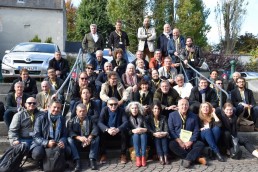
Forty-seven professionals are doing us the great honour to participate in the jury's deliberations. This 25th edition will be presided by Christiane Amanpour. The jury will review 50 reports and award seven trophies.
PATRICIA ALLEMONIÈRE – TF1
GUILLAUME BALLARD – OUEST-FRANCE
MARIE-EVE BÉDARD – RADIO CANADA
LOÏCK BERROU – FRANCE 24
MICHEL BEURET – GRAND REPORTER
ÉRIC BIEGALA – FRANCE CULTURE
CHRISTOPHE BOLTANSKI – GRAND REPORTER
JEREMY BOWEN – BBC
JEAN-PIERRE CANET – SCAM
PATRICK CHAUVEL – PHOTO-REPORTER
ALBÉRIC DE GOUVILLE – MAISON DES JOURNALISTES
PATRICK DE NOIRMONT – PHOTO-REPORTER
JÉRÔME DELAY – ASSOCIATED PRESS
GRÉGOIRE DENIAU – GRAND REPORTER
SAMUEL FOREY – XXI
FRANCIS GAUGAIN – FRANCE BLEU NORMANDIE
JEAN HATZFELD – JOURNALISTE ÉCRIVAIN
CÉCILE HENNION – LE MONDE
ETIENNE HUVER – GRAND REPORTER
KATIA JARJOURA – RÉALISATRICE
OLIVIER JOBARD – PHOTO-REPORTER
CHRISTOPHE KENCK – FRANCE TV
FRANCIS KOHN – JOURNALISTE
KAREN LAJON – LE JOURNAL DU DIMANCHE
MARTINE LAROCHE-JOUBERT – GRAND REPORTER
ALAIN LE GOUGUEC – SCAM
PATRICE LORTON – CAPA PRESSE
GUILLAUME MARTIN – GRAND REPORTER
LUCAS MENGET – FRANCE INFO
ALAIN MINGAM – CONSULTANT MÉDIAS
JEAN-MARC MOJON – AFP
CATHERINE MONNET – RSF
MARCO NASSIVERA – ARTE
CATHERINE NAYL – FRANCE INTER
SOPHIE NIVELLE-CARDINALE – GRAND REPORTER
SYLVIE NOËL – RFI
JEAN-PIERRE PERRIN – JOURNALISTE ÉCRIVAIN
JON RANDAL – GRAND REPORTER
LAURENT REBOURS – ASSOCIATED PRESS
PATRICK ROBERT – PHOTO-REPORTER
MORT ROSENBLUM – GRAND REPORTER
MARC SIMON – JOURNALISTE
JON SWAIN – GRAND REPORTER
ESTELLE VERET – REUTERS
ED VULLIAMY – THE GUARDIAN
VIVIENNE WALT – TIME MAGAZINE
THOMAS ZRIBI – NOVA PRODUCTIONS
Nikon Workshop – Le Manoir

In the framework of the Prix Bayeux for War Correspondents, Nikon will be organising a workshop for talented young photojournalists, as it has done each year since 2013.
This year, Nikon is joining forces with the Manoir Centre, which was set up in 2014 by France Médias Monde to provide training for journalists working in dangerous zones. In association with INA (the French national audiovisual archive) and with the support of Reporters Without Borders, the Manoir will soon have trained almost 300 journalists from a variety of backgrounds. The training course was designed for journalists working for France Médias Monde, but is open to all media and is training journalists from Le Monde newspaper, Arte, Canal + and the French public television channels, among others. The training provided by the Manoir is now recognised as the reference standard in its field.
While it is obvious that research and information-sharing are essential, the safety of journalists on assignment has to be both the primary concern and the starting point in the editorial process. Because the journalist is the principal player in his or her own safety, the Manoir provides specific training and methodologies given by journalists to journalists, and brings in leading experts in the fields of health, emergency rescue and psychology. The effects of weapons, the dangers of mines and orientation skills are also taught by expert practitioners who are experienced in training news professionals.
By the end of the training course, the journalist situated in a danger zone is able to assess risks more accurately, to understand critical situations and to react more adroitly to accidents in the field.
With over a century of existence and by virtue of its values and commitment, supporting photojournalists is part of Nikon’s DNA. In partnership with the Manoir, Nikon wants to support talented young photojournalists in the exercise of their profession by giving them the best possible training.
Come and meet us at the Prix Bayeux Calvados and talk to our teams.
Christiane Amanpour, President of the jury
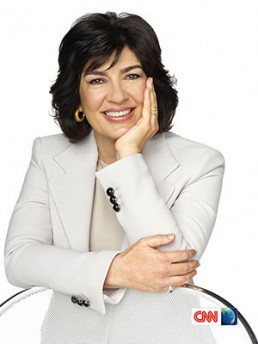
A world-famous journalist has done us the great honour of agreeing to preside over the jury’s deliberations this year. Christiane Amanpour is one of the best-known journalists in the profession and a winner of many awards.
Christiane Amanpour is CNN's chief international correspondent and anchor of the network's award-winning, flagship global affairs program "Amanpour," which also airs on PBS in the United States. She is based in the network's London bureau.
Beginning in 1983 as an entry-level assistant on the international assignment desk at CNN’s headquarters in Atlanta, Amanpour rose through the organization becoming a reporter at the New York bureau, and later, the network’s leading international correspondent.
Amanpour’s fearless and uncompromising approach made her popular with audiences, and a force to be reckoned with by global influencers — in 1996, Newsweek said that her reporting from conflict hotspots in the Gulf and the Balkans had helped make CNN ‘must-see TV for world leaders’.
From the 1991 Gulf War, the 2003 American-led invasion, Amanpour has documented the bloody violence which has marked Iraq’s recent history. In 2004, she also reported exclusively from the courtroom at the trial of Saddam Hussein, where the former dictator, disheveled and in chains, was eventually sentenced to death for crimes against humanity.
On the ground during the siege of Sarajevo, Amanpour exposed the brutality of the Bosnian War, reporting on the daily tragedy of life for civilians in the city. She was outspoken, calling out the human rights abuses, massacres and genocide committed against the Bosnian Moslems, later saying “There are some situations one simply cannot be neutral about, because when you are neutral you are an accomplice.”
In 2009 “Amanpour” was launched, and the primetime interview program has seen Amanpour speak to a raft of leaders and decision makers on the issues affecting the world today.
Throughout her time at CNN Amanpour has secured exclusive interviews with global power players. In the wake of the September 11 attacks she was the first international correspondent to interview British Prime Minister Tony Blair, Pakistani president Pervez Musharraf and Afghan President Hamid Karzai. During the height of the Arab Spring she conducted an Emmy-winning interview, the last, with Libya’s former leader ‘Colonel’ Moammar Gadhafi, she was also the last journalist to interview Egypt’s President Hosni Mubarak just before he was deposed.
Following his landslide election victory, Amanpour spoke exclusively to Iranian president Hassan Rouhani, eliciting from him acknowledgement of the occurrence of the Holocaust. She was the first journalist to interview Brazilian President Dilma Rousseff following her country’s shocking defeat in the 2014 World Cup semi-final. She also had the rare opportunity to sit down with Venezuelan President Nicolas Maduro, talking to him about the widespread violent demonstrations in his country.
In January 2014, Amanpour also exclusively broke the news of a dossier of testimony and photographs which alleged to show systematic torture of prisoners by government forces in Syria, welcoming a panel of war crimes experts who attested to the veracity of the shocking allegations. It was with this evidence that she later confronted Russian Prime Minister Dmitry Medvedev — challenging him to justify his government’s support for the Assad regime.
She has reported from the aftermath of many humanitarian crises including the devastating 2010 earthquake in Haiti, the 2011 Japanese tsunami, and Hurricane Katrina, where she visited a community center which had been converted to a makeshift morgue for victims of the storm.
In addition to her work as an anchor and reporter, Amanpour is an active rights campaigner. A board member of the Committee to Protect Journalists, the Centre for Public Integrity and the International Women’s Media Foundation, she has used her profile to raise awareness of key global issues and journalists’ rights. She has interviewed educational rights activist Malala Yousafzai for CNN on several occasions — bringing focus to her courage and international advocacy work. In May 2014 she used an appearance on BBC television to raise awareness of the plight of the 200 Nigerian schoolgirls abducted by Boko Haram – asking British Prime Minister David Cameron to join the #BringBackOurGirls campaign.
Amanpour has earned every major television journalism award including eleven News and Documentary Emmy Awards, four Peabody Awards, two George Polk Awards, three duPont-Columbia Awards and the Courage in Journalism Award. She has received nine honorary degrees, has been named a CBE and was this year inducted into the Cable Hall of Fame. She is an honorary citizen of Sarajevo and a UNESCO Goodwill Ambassador for Freedom of the Press and the Safety of Journalists.
Amanpour graduated summa cum laude from the University of Rhode Island with a Bachelor of Arts in Journalism.
Call for candidates
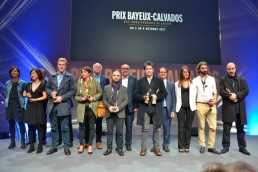
The Bayeux Calvados-Normandy award for war correspondents rewards reports about a conflict situation or its impact on civilians, or news stories involving the defence of freedom and democracy.
The report must have been made between 1 June 2017 and 31 May 2018. A €7,000 prize is awarded in each category.
The reports must be submitted to the following address by 8 June 2018:
Bayeux Award for War Correspondents – Hôtel de Ville – 19, rue laitière – BP 21215 – 14402 Bayeux Cedex or info@prixbayeux.org
The categories of media represented are: radio – photography – television (short and long formats) – written press and the young reporter prize (photo this year).
Ten prizes are awarded
Six prizes awarded by the international jury
- Written Press Prize sponsored by the Calvados Department – €7000
- Television Prize sponsored by Amnesty International- €7000
- Radio Prize sponsored by the D-Day Landing Committee – €7000
- Photo Prize sponsored by Nikon – €7000
- Grand format Television Prize sponsored by the Scam – €7000
- Young reporter Prize sponsored by CAPA agency – €3000
Four special prizes
- The Ouest-France – Jean Marin Prize (written press) – €4000
- The Public Prize (photo) sponsored by the Agence Française de Développement – €3000
- The Normandy Region secondary School Students’ Prize (television) – €3000
- The video image prize sponsored by Arte, France 24 and Bew TV – €3000
Regulations
• The Young Reporter’s Award: in 2018: the category is photo. Since there is a different category according to the years, the presented story must have been realized between 1 June 2016 and 31 May 2018.
• Written press category: the application must be made up of an article or a series of one to five articles on the same subject.
• Television category: the length of the report must be between 1 minute 30 seconds and 6 minutes. The report submitted must be identical to the broadcast piece.
• Grand format television category: the length of the report must be between 6 and 30 minutes. The report submitted must be identical to the broadcast piece.
• Radio category: the length of the report must be between 1 minute and 6 minutes. The report submitted must be identical to the broadcast piece.
• Photo category: The application comprises a report made up of 8 to 15 photos.

